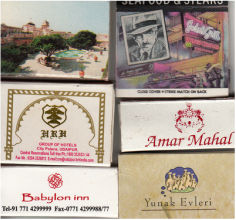
To compensate, I filled the walls of my bedroom with maps of the world that I drew and colored on great sheets of butcher paper. I have no doubt that I was fantasizing escape as I filled in the outlines of each country with bold colors on those sheets of paper and then penned in the name of each foreign place. Scotland and France, Poland and Turkey, Egypt and Morocco, Pakistan and India. London. Paris and Vienna, Prague and Athens. Every time I penned a name on a map, I felt the magic in that word and the place for which it stood.
A package appeared in our mailbox, one day. My Uncle Douglas, who’d spent his adult life traveling around the world, had sent me his collection of matchbooks he=d picked up from across the globe. During his nearly fifty years, he=d visited every continent except Antarctica, dropping matchbooks into his pockets along the way. And what matchbooks!
These matchbooks were different from the free ones my father got at bars and markets. Often oversized and brightly colored, they advertised fancy restaurants and elegant hotels, cocktail lounges and resorts in Europe, South America, and the Far East. Sometimes, the matches themselves were colored to make pictures so beautiful you=d never want to tear off one to use. A peacock flaunting an open tail. A palm-bordered Spanish hotel. A brown-skinned woman peeking over a raised shoulder. A curving bay protected by the sands of a golden beach.
Worlds beyond my grasp, but not my imagination. It was like a science fiction story: people existing simultaneously on different planes. Time and space were meaningless. Bodies became transparent, passing through each other. Walls couldn=t stop them any more than miles could. How I envied my uncle and his elegant wife for their adventures. Mom was afraid that these souvenirs of distant lands would give me ideas. Of course they did. These visions of exotic locales and the extravagant life they represented lifted me out my boring existence and set me in Raffles= hotel bar and the London Ritz, in the Casino at Monte Carlo and in a Rio nightclub. Why not, I thought, why not?
At this moment, I reminded myself, men in tuxedos and women in long gowns are walking across that terrace, sitting at those tables, gazing on those trees, standing under that sky, eating magnificent food in this restaurant. They=re speaking French and Spanish, sipping cocktails, riding in open convertibles along grand avenues. They=re painting pictures, singing songs, acting in famous theaters. They=re growing coffee beans and silk worms, building skyscrapers, sailing on luxury liners. Beneath those leaning palms and arched arcades, people who are not me are happy.
If I couldn=t live on the world stage, at least not yet, I could collect objects that let me escape, at least in my mind, to someplace else. Coins and stamps from other countries, rocks and stones and seashells and pieces of coral from far off peaks and shores. The square box of my bedroom was crowded with symbols of liberation. Freedom.
Eventually, I married and began traveling. Of course, I began slipping matchbooks into my pocket from time to time. The matchbooks that I found and saved, although colorful and evocative of exotic and fascinating places, seldom were as extravagant as the ones my uncle had passed on to me. Nevertheless, I persisted as the years went by, and filled my pockets and eventually a drawer at home with matches from hotels in India, Peru, Iran, Cuba, Portugal, England, and other countries that my wife and I visited and explored.
Some of these matchbooks and boxes became battered or were lost as the years chugged along, but I still have most of them. I enjoy pawing through them. It’s as if the United Nations has flowed into that drawer, reminding me that although each country is unique, they also have a lot in common. All of them were exciting, interesting places to be. And I know that I’ll slide many more colorful reminders of this ever-various, constantly changing world into my pockets.
 RSS Feed
RSS Feed